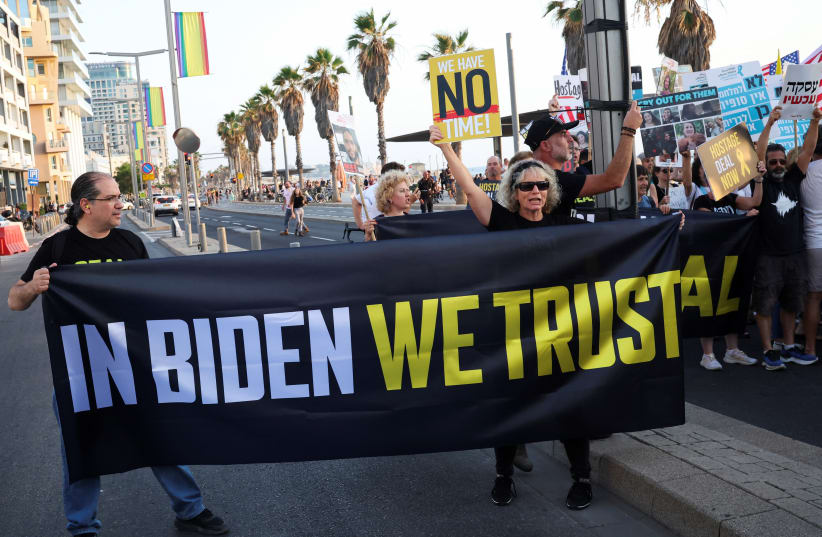Rather than getting clearer, the details surrounding a possible ceasefire in the Gaza war that will enable a partial hostage release get more confusing and murky every day.
Was the plan unveiled last Friday by President Joe Biden an Israeli initiative, as the US president stated? If so, why has Prime Minister Benjamin Netanyahu distanced himself from many facets of the proposal? And how can the Israeli government approve or endorse such a plan when two of its members with sizeable clout, Itamar Ben-Gvir and Bezalel Smotrich, are threatening to leave and topple the government if it’s implemented?
All of those questions come against the backdrop of two connected developments that are threatening to barrel out of control: the intolerable situation in the North, where Hezbollah’s war against Israel demands a powerful response, and Monday’s announcement that five more Israelis who were counted among the presumed hostages being held by Hamas in Gaza are dead.
Chaim Peri, 80, Yoram Metzger, 80, and Amiram Cooper, 85 – all from Nir Oz – and Nadav Popplewell, 51, from Nirim – were confirmed as having been killed while in Hamas captivity in the Khan Yunis area. Another presumed hostage, Dolev Yehud, 35, was found and identified in Kibbutz Nir Oz, the IDF confirmed Monday morning. Yehud, who worked as a medic, was killed on October 7 after leaving his home to save lives during the Hamas massacre.
The country is now firmly divided. There are those who say that a ceasefire now, no matter how one-sided or dangerous for the future, is the only way to enable the return of any hostages who are still alive. Others argue that toppling Hamas so that it is incapable of committing another October 7 and will not continue controlling Gaza is paramount.
That schism was apparent at The Jerusalem Post Conference in New York, where members of hostage families clashed with members of the government and security experts, who preach that the more pressure put on Hamas, the better the chances are of freeing the hostages.
Where does Prime Minister Benjamin Netanyahu stand? It’s hard to tell. If his cabinet is the source of the Biden plan, then he is adamant about making concessions to free the hostages. If his statements saying that the battle will not stop until Hamas is defeated are more than a panacea to his extremist partners in the government, then he’s adamant about continuing the war until its end.
Israel's never-ending troubles in the wake of war
As murky as the positions and maneuvering are, what is becoming crystal clear is that the country cannot continue careening on the hazardous path it’s currently on, seemingly without a driver. Hostages are dying, the North is ablaze, and the country’s citizens are returning to their pre-war, judicial reform era of blame and animosity.
Netanyahu is stuck between a rock and a hard place. In an effort to keep his coalition intact and remain in power, he apparently is telling the US one thing, his right-wing coalition partners something totally different, and the Israeli people pretty much nothing.
One way out is to let Ben-Gvir and Smotrich quit and to take opposition leader Yair Lapid’s offer to serve as a safety net for the government to implement the Biden plan.
Speaking in the Knesset plenum, Lapid said there was an overwhelming majority of 82 members of the Knesset willing to sign off on the deal, and he urged Netanyahu to move forward with it. (Shas announced on Tuesday that it supports the deal).
Granted, the ceasefire agreement is full of flaws: it does not provide an alternative to Hamas, and it wrongly assumes that Hamas is no longer capable of inflicting damage on Israel.
But it does create a mechanism to free some hostages and provide some relief to the North, assuming that Hezbollah will refrain from attacking Israel during the implementation of the ceasefire plan.
Of course, ultimately, in an ironic twist of fate, the decision about where we go next isn’t even in our hands. It’s up to Hamas, which hasn’t yet officially responded to Biden’s ceasefire statement.
We can’t control that, but we can say, with our hearts and with our voices, a resounding ‘yes’ to the plan that will create a glimmer of hope for the hostages to return home.

